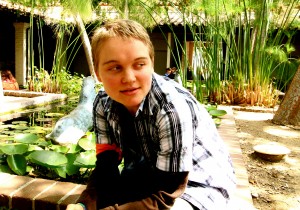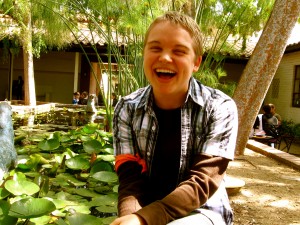Changing Pronouns: Jos Greene
 Meet Jos Greene, a junior at Scripps College who has recently begun to identify as transgender. In the following interview he discusses the rewards and challenges of his transition, his perspective on the women’s college experience, and his hopes for the future of Scripps students.
Meet Jos Greene, a junior at Scripps College who has recently begun to identify as transgender. In the following interview he discusses the rewards and challenges of his transition, his perspective on the women’s college experience, and his hopes for the future of Scripps students.
Where are you most likely to be seen on campus?
In the Motley or on my way there. I thought that since I work there, now that would make my flex last longer, but I’m seeing that’s not the case. (He laughs) Especially since I’ve discovered this fabulous drink, the Lyssey. It’s orange juice, soy milk, and Emergen-C blended together and it’s pretty much a smoothie of vitamin deliciousness!
What has your transition process been like?
Last year I ran the Queer or Questioning Allied Mentor Program (QQAMP), the queer mentor program for the 5Cs, and in preparation for the training, I started educating myself about parts of the queer community I wasn’t a part of. I’d never met anyone who identified as transgender, so this was a period of massive consciousness-raising for me. Then in the fall I took a class, Biology, Gender, and Society, that piggybacked on that research, talking about how gender is socially and biologically constructed. My ability to identify as trans was definitely dependent on having access to that language and existing in a space where the embodiment of that identity was imaginable, so I like to start my “coming out narrative” with that foundation.
Then last spring I was a founding member of a student group that raised awareness about trans identity and lobbied administrators for more trans-inclusive policy. This, in retrospect, feels very much like in high school when I joined our Gay-Straight Alliance (GSA) as an ally. I thought, “I’m so drawn to advocacy for these issues. Why is this so compelling for me?” And my subconscious said, “Find your people, make spaces safe for you!”
All of my subconscious processing culminated last summer when I volunteered at the Boston Living Center, an organization that provides services to people living with HIV/AIDS. I’d spent the majority of my time in college in dyke and queer female community, so spending time at the Living Center where the majority of members were queer men was a really new and eye-opening experience for me. It was incredible to enter a space where such a spectrum of masculinities were represented and celebrated. Plus, I looked fairly androgenous and members would flirt with me innocently, saying they didn’t know if I was a boy or a girl, but they thought I was cute. Which was flattering and fun and another moment of wondering, “Why does this feel so good when people recognize my masculinity? Subconscious, awaken!” Since I’d spent the past year doing advocacy work for trans people, I guess I finally had the perspective to recognize my comfort and relief at being read as male. So, I came out to my family at the end of the summer and when I went back to school I shifted my name and pronouns.
 How do you understand your position at a women’s college as a trans guy?
How do you understand your position at a women’s college as a trans guy?
(He takes a deep breath.) That’s the big question isn’t it? I think there is a lot of anxiety around the presence of trans students at women’s colleges. And I understand that. I think people are pushed to defend their decision to come to a women’s college and, collectively, we’re failing to articulate why women’s colleges are necessary in a contemporary context. So, because we have no modern mission, people see how women’s colleges operated in the past as exclusively women’s spaces and are worried that the presence of trans students indicates that women’s colleges no longer have a purpose and Scripps is going to turn to co-education.
The funny thing about that is that I see the inclusion of trans students at a women’s college as theopposite. Co-education is about stabilizing gender and assuming there are only two genders and that “women” means something relative to “men.” Women’s colleges were founded to give women a space to develop their own identities, in a community, relative to other victims of gender oppression, with the hope that they could find more empowering ways to live their lives outside of the normative definition of what it meant to be a “woman.” I see my own experience as fundamentally built on this feminist legacy of re-thinking gender and giving female-bodied students a space to take control of their lives and their bodies in ways that dominant culture says are unacceptable or invalid. That being said, I understand living as a guy confers a level of male privilege onto me, and I am constantly trying to be aware of my positionality so I can use that privilege to advocate for feminist ideals and not perpetuate sexist notions of power. So I think it’s sticky, trying to negotiate that privilege, but I think that living as a woman for twenty years positions me really powerfully to be an ally to cisgender women and to participate in discussions about rethinking gender dynamics. I see a lot of potential for coalition between cisgender women and trans guys to de-stabilize and “un-think” social dominance of “men” over “women.” Ultimately, we are combating patriarchy and sexism, which are systems, not individual people. Women can be sexist, trans guys can be feminist. The ideas aren’t reducible to your body or your gender. They’re a reflection of your commitments and the way you live your life.
What have been your biggest challenges?
Coming from a semester at Smith College was a bit of a struggle. At that school, there was a larger trans community, people asked about pronouns, and had greater awareness of trans identity.” Especially when I first got back to Scripps, it was hard to feel like I had to explain my identity to everyone or no one would even consider the possibility that I might not identity as female.
It’s been important for me to remember that it’s a process for people to develop skills in affirmatively being allies. I know that it takes time to get used to new pronouns and most of my friends haven’t known a trans person before, but it felt isolating to have no positive reinforcement of my identity.
What have been your biggest victories?
It absolutely makes my day to hear someone properly pronoun me, especially in public. On the one hand, it’s something small that shouldn’t be a big deal. But it doesn’t happen that often, so it feels like such a gesture of love and respect. Getting my school email changed! Logistically useful, but also great to feel my identity recognized by the institution. I’ve also started a discussion group at the Queer Resource Center (QRC), GendeRevolution, that talks about gender identity and expression. It’s a pretty big group, 15 people or so, and everyone comes in with a different perspective. I feel like I’m learning a lot from our conversations, and it means a lot to me to have that space.
Next year will be your last at Scripps. What hopes do you have for the future of the college as a community?
I see Scripps at a turning point right now, especially with our new president. I’m excited by the possibility of having conversations to shift Scripps in a new direction so that its vision extends to students with a diversity of experiences. There are a lot of student voices here that aren’t heard and aren’t represented–not just mine. I’d like to be a part of creating a more expansive notion of who a Scripps student is, what the Scripps experience can be, and what specific changes need to be made so that everyone who attends this school is supported and empowered to actually live “confidently, courageously, hopefully.”
Glossary of Terms:
•cisgender: someone who associates and is comfortable with the gender they were assigned at birth.
•transgender: a term describing persons whose gender identity, expression or behavior challenges the gender traditionally associated with their birth sex.
•genderqueer: a term generally referring to forms of gender expression or identity outside the gender binary
•transition: the process of developing and assuming one’s preferred gender identity
•feminist: a person committed to ending sexism, sexist exploitation, and oppression. (Thank you bell hooks!)

![[in]Visible Magazine](https://community.scrippscollege.edu/invisible/wp-content/uploads/sites/5/2011/04/Invisible-Masthead-2011-Spring1.png)







No comments yet... Be the first to leave a reply!